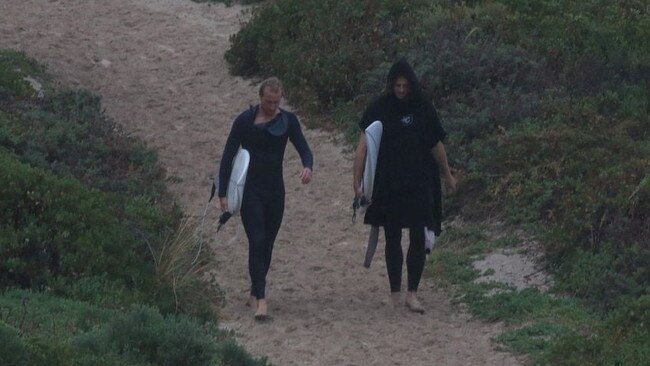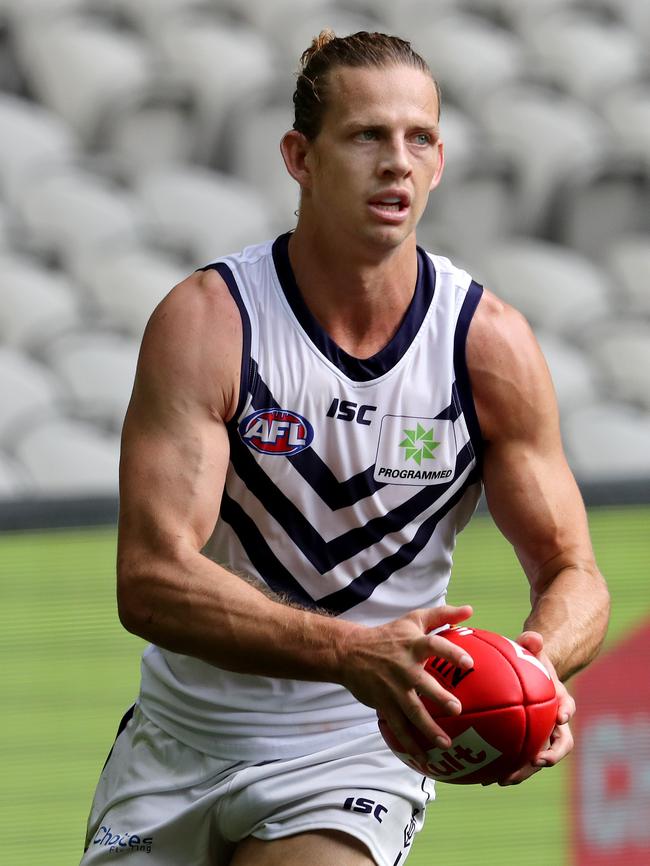Coronavirus: AFL star Nat Fyfe cleared over surf stop
Dual Brownlow medallist Nat Fyfe will not be fined for surfing far from home during WA’s regional border lockdowns.

Dual Brownlow medallist Nat Fyfe will not be fined for surfing far from home during Western Australia’s regional border lockdowns.
Police have reviewed the circumstances surrounding Fyfe’s presence in the south west region where he was photographed going for a surf, some 270km from his Perth home and 390km from Lake Grace, the wheatbelt town where he grew up and where his parents still live.

Since March 31, non essential travel between regions has been banned in WA and police and the Australian Army have been manning checkpoints to block holiday makers and others without a legitimate reason to move between regions.
Fyfe was photographed near Margaret River in the surfing and wine region called the south west. It is not the same region as his childhood home, which is in the Wheatbelt or the same region as Perth where he lives during the AFL season.
But The Australian understands Fyfe was doing work for his family’s trucking business when he entered the south west.
“It has been confirmed that Mr Fyfe entered the (south west) region in order to provide transport services and was waiting for a truck to be loaded when he went surfing,” police said in a media release.
“As a result, Mr Fyfe had a valid exemption and was compliant with Directions regarding regional travel.
“It has further been established that Mr Fyfe did not breach social distancing requirements.
“The intent of the Directions is to reduce travel in order to slow the spread of COVID-19 in Western Australia. “Exemptions for regional travel do apply, but exempt travellers must only travel as required and must only stay in the region for as long as it takes to complete the essential service.”
Commissioner Chris Dawson said the interpretation of the law had been examined and it had been determined that Mr Fyfe did not breach the Direction.
“The spirit of the law is that people apply common sense and only move to another region for the purposes of performing an essential service,” Mr Dawson said. “I will change my Directions if I learn of people’s behaviours putting others at risk.”
On Thursday night the Fremantle Football Club released a statement saying the club could confirm that Fyfe has an exemption note that stated he was an approved Western Australian essential traveller and had been acting in accordance with its guidelines.
Fremantle CEO Simon Garlick said that following the suspension of the AFL season, Fyfe had been working for his family’s Lake Grace-based transport business.
“With the appropriate exemption notice Nat has, for the past two-and-a-half weeks, been driving a truck for his family’s transport business, including carting lime out of Margaret River,” Garlick said.
“Our understanding is that if you are approved to be in a different region for a period for legitimate work purposes then you can exercise in that region in accordance with the guidelines.
“Nat has been following all the regulations and guidelines regarding social distancing since they have been released and frequently updated, as everyone is endeavouring to do.
“As a club we are encouraging our players to do whatever they can to keep occupied while the season is suspended, including working hard in an operating business as Nat has been doing.
“We also require that our players maintain a high level of fitness and general well-being during this downtime by following a daily exercise regime.
“The club categorically supports Nat’s decision making throughout this episode. He understood he was doing so in accordance with all current responsible practices regarding social distancing.
“As a club we are fully supportive of all of the Government regulations that have been introduced to reduce the spread of Covid-19.”
Mr Fyfe will not be infringed over this matter, which is now finalised, police said.
In WA, there were 495 confirmed cases of COVID-19 on Thursday. Of these, 56 were confirmed to be from regional areas.
The regional borders are an attempt to slow the spread of coronavirus to country areas, some of them with vulnerable populations of elderly or indigenous populations.
People are exempt from travel bans between regions in WA for reasons including work or to receive medical care.



